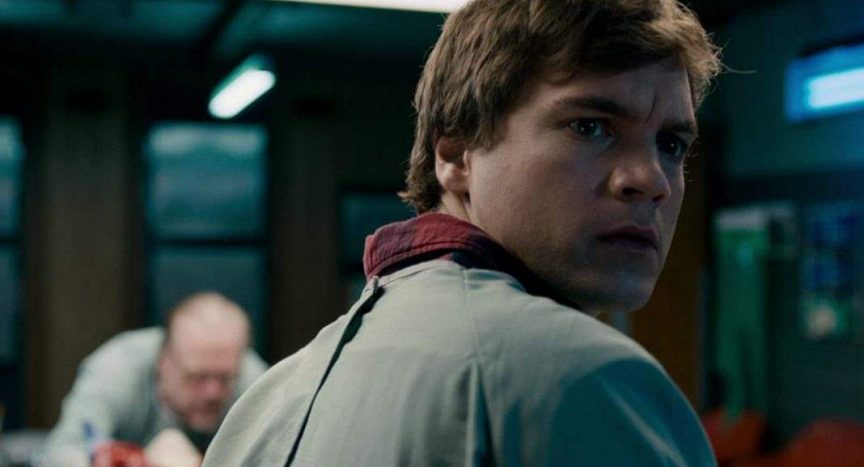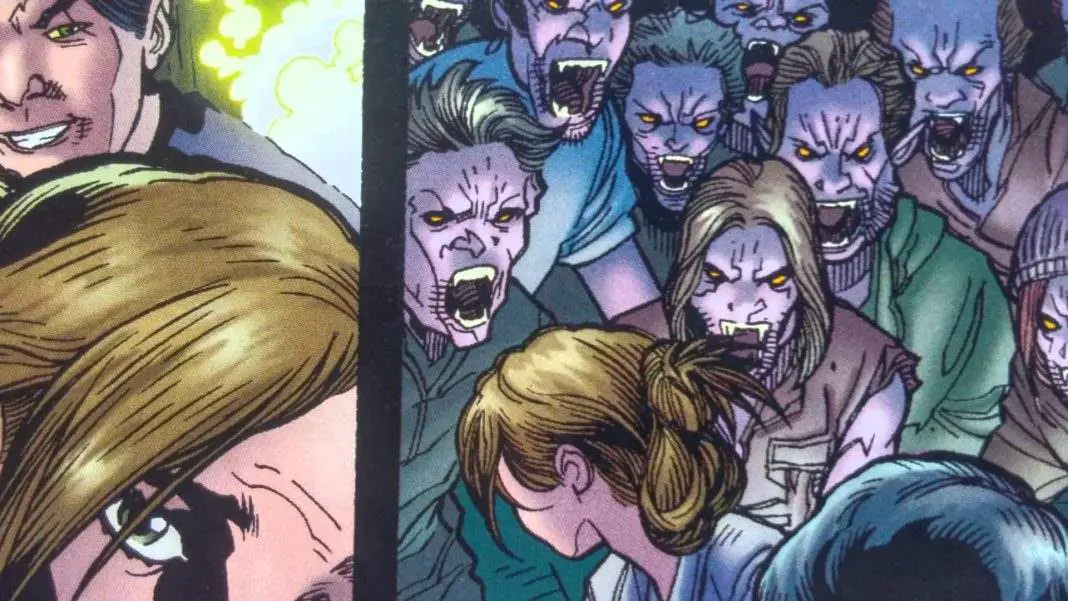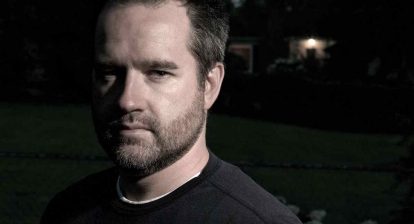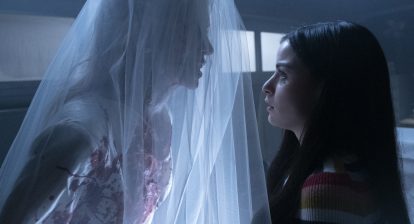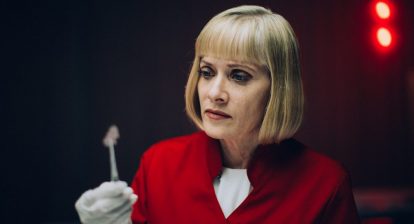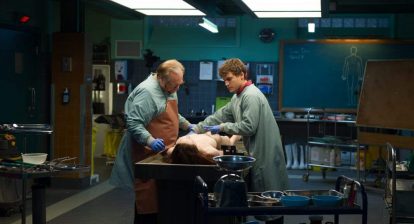Emile Hirsch has had a long and varied career, starring in movies as far-ranging as The Girl Next Door and Killer Joe, and working with auteurs including Gus Van Sant, William Friedkin and Oliver Stone. He’s pretty much done it all over the past twenty years, never one to make the obvious choice, but The Autopsy Of Jane Doe sees the (still) young actor take his first, tentative steps into the world of horror.
Playing Austin, part of a father-son team working at a local mortuary (the family business), opposite the great Brian Cox, Hirsch takes on one of the most challenging roles of his career thus far. All manner of otherworldly elements are thrown at the pair as they struggle to figure out what happened to the mystery woman of the title—the gruesome post-mortem neglecting to give the full story.
Wicked Horror caught up with Hirsch to discuss The Autopsy Of Jane Doe, how he prepared to tackle the difficult role of Austin, and what it was like to act against a real person playing dead.
Wicked Horror: Austin is quite a different character for you. What attracted you to this particular role, this project as a whole?
Emile Hirsch: I think there was something about the idea of a father and son who are trying to get over this really devastating thing that happened in their past, with their mom and wife. There’s this lingering depression that these two men have and they’re sort of dealing with grief in their own separate, unique ways. There was just something so melancholy about it and that melancholy, I felt like, usually in horror movies it’s just sort of young people running around getting hacked up and there’s no real depth. With this, something about that idea of the melancholy, it just had a weight and a depth to it which, as a role, even though it’s within the horror genre, I felt like there’s actually some real dramatic weight here that I felt could help to create a character that could come alive for an audience, and maybe move people or be thought-provoking. And then to add to this element, Andre Øvredal, who is a very talented Scandinavian director, and also Brian Cox, who’s this incredible actor, it felt like we would be able to explore that material in an entertaining and smart way.
With this, something about that idea of the melancholy, it just had a weight and a depth to it which, as a role, even though it’s horror, I felt like there’s actually some real dramatic weight here
And I was totally vindicated, because Andre turned out to just be a masterful director… He’s just such an amazingly talented filmmaker. The way he edited the movie, the way he set out the dramatic scenes—even the way he left out some of the key moments, that I saw when the cut was complete—they all illustrated the fact that he’s got a very refined sense of taste when it comes to dramatic tension, as well as genre and pacing. I think he’s going to make a really good director of dramas, too, just straight dramas. It’s something to do with that Scandinavian core that I think likes restraint in performances, too. He loves actors holding back and not just vomiting their acting on the screen. He comes from the frame of mind that the viewer’s eye will be more drawn to less movement and studying [the frame] for any movement that might happen, you know? It’s a ballsy thing to do but I think it pays off in this film, hugely.
WH: How did you go about preparing to play somebody who works in a morgue? Did you do anything special?
Hirsch: Well, on my birthday, I turned thirty years old [pauses for effect] and I went to the L.A. Morgue and I signed all this paperwork that said I wouldn’t sue them if I got Ebola while I was looking at the bodies. Now, the L.A. Morgue is one of the biggest morgues under one roof in the world. In fact, according to the director, Craig Harvey, it is the biggest morgue under one roof on earth. It’s this huge facility in downtown Los Angeles, with 400-500 bodies depending on the time of year… There’s also a huge, active autopsy room. And then there are multiple other rooms with body parts in formaldehyde and other preserving fluids, there’s a photographic room where they photograph all the bodies that come in… I mean, I’d never seen a dead body before and that was like being thrown in ice water or something. It was really… Aside from just researching the role, it really kind of changed how I perceived life, as heavy as that sounds. It’s not like I have an illusion of “you never die!” or something like that, but when you actually see the bodies there, it’s very life-affirming in a weird way.
one of the reasons the movie is really freaky and Really scary is because it shows people the other side. Aside from the supernatural, horror elements, just the actual setting, looking into the abyss of death
And I asked the director, Craig [Harvey], we were looking at these active autopsies, so I asked him “are you happy to be alive?” and he looked at me and he was like “oh yeah”, you know he was just so excited to say how happy he was to be alive. So, on one hand, it’s kind of depressing that these people have come to these unfortunate ends and that they’ve sort of crossed over to the next part of their journey, but it also brings this feeling that you’re so different from them because you’re still alive, and you have your life and it’s such a gift that we have. So it was very positive in that way. And I think one of the reasons the movie is really freaky and really scary is because it kind of shows people the other side a little bit. Aside from the supernatural, horror elements, just the actual setting of kind of looking into the abyss of death. And then when you add in all the scares I think it just puts them over the top.
WH: We have to talk about Brian Cox, who plays your Dad. He’s an absolute legend. What was it like acting opposite him?
Hirsch: It was such a privilege. I have been such a fan of Brian’s for so many years, and I know what a legend he is, not just in movies but also on the stage. It was just a real honour to get to work with someone who, in a lot of ways, is like an unsung hero almost. To get to share the stage with him, and have him be the leader and kind of help guide me through a difficult part, was an honour. Because, it was such a technical choreography we were doing, with all these tools, and he was just so inspiring, to see him every day choreograph the scenes and the emotional beats and help show me the best way to use these tools and to move. He really was in charge. And he was so experienced and knew exactly what he was doing. He showed up completely prepared, completely off the page, he had the whole movie in his head and could totally change his performance at any moment. I actually stole Brian’s technique of just being constantly prepared, I’ve taken that with me onto the next couple movies I’ve done, after seeing how free he was, where he just knew the material and could sort of play with it. I mean, I’ve seen other actors do it before but I hadn’t seen it as effectively as Brian. And the way that we were doing these very technical scenes, it was invaluable preparation. He really pushed me, I think, to be better than I would’ve been before, which is just the highest compliment I can give an actor. I loved watching him, too.
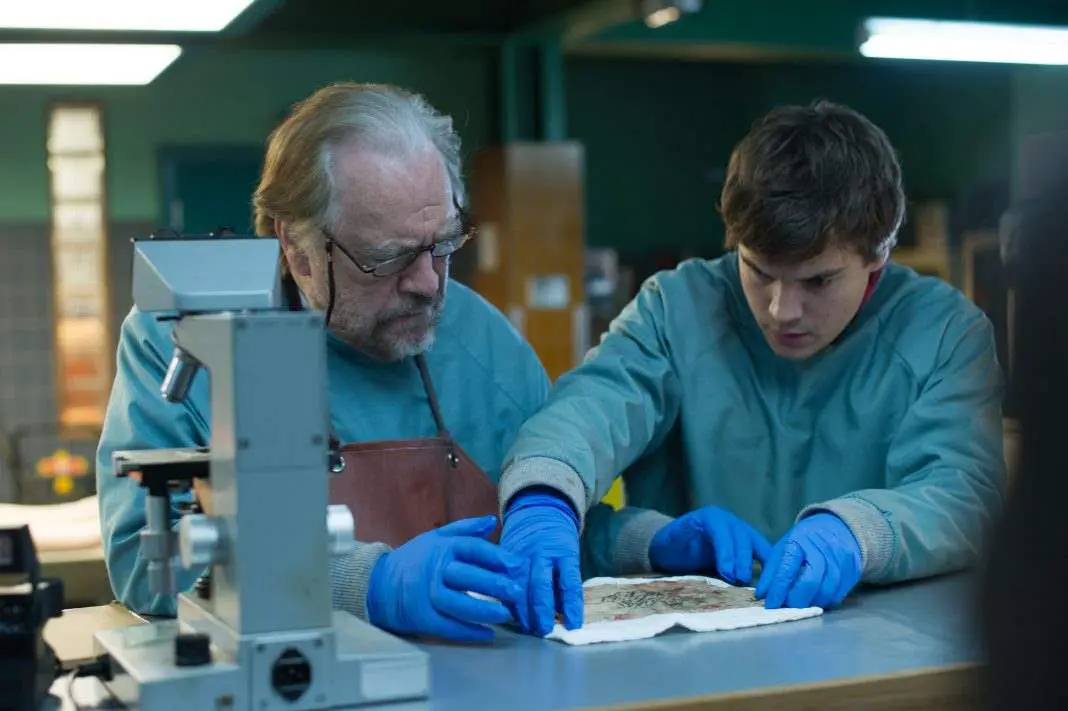
WH: You guys have a very natural rapport. You’re very believable as family members. Was it easy to find that chemistry?
Hirsch: Brian has a son himself and is a really great dad. I had so much respect for him coming in and then when I saw what a sweet, kind, gentle guy he was, I just felt like it was a super natural fit. There was just mutual affection. That wasn’t forced at all. I suppose there are other actors whose egos would get in the way, and that would make that dynamic so hard because it’s really hard to fake an easygoing affection. That’s one of the hardest things to fake. You might be able to fake over the top love or something but actual, easygoing goodwill is strangely hard to force.
WH: The other piece of the puzzle, of course, is Olwen Kelly, who was really lying there the whole time during filming. How was it acting opposite someone playing dead?
Hirsch: Well, what’s interesting is how, while Brian and I had a relationship of levity, you know almost breaking the rules of serious actors, in terms of the way we approach the material at certain times, Olwen, on the other hand, was more of a quote-unquote “Method” actor. She barely ever spoke a word to either one of us. She was so pointed about it that I felt like she just didn’t want us to know her so we’d be forced to view her as this sort of inanimate object, as “the body”. I think she didn’t want us to view her as “Olwen”. She wanted us to interact with her in that way only. But Brian and I were both super careful at all times, during all the scenes, because we’re handling her limbs at certain moments, so we wanted to make sure she was always comfortable with any movements, and that she was always safe. I was really impressed too, because I knew what a hard—and I mean physically hard—performance that was, because that marble slab she was lying on was really hard, and she’s lying on it for eight, nine hours a day, a long period of time.
Olwen Kelly barely ever spoke a word to either one of us. I felt like she just didn’t want us to know her, so we’d be forced to view her as this sort of inanimate object, as “the body”
The slab would cool down and be freezing, and they would try to heat it up, but with a naked body lying on it all day there was only so much they could do. So she was super cold and then, of course, when you lie on those super-hard surfaces for long enough your body starts to bruise and get sore. The mental patience it takes for these shots, when Cox and I are walking around the table, holding tools and discussing her, moving her around, and she has to stay totally still. It’s one thing to say “okay, I’m gonna be still and not move”, it’s another thing to be unable to move for five minutes and the weird mental pressure that creates. It’s almost like those guys who stand outside the Queen’s palace in England and can’t move. It’s kind of like that. The mental strength you have to have to do that job.
WH: You mentioned earlier how The Autopsy Of Jane Doe fits into the genre, as a whole. Are you a fan of horror yourself? Has this sort of given you the bug to do more horror movies?
Hirsch: Yeah, I love watching good horror. I just saw The Wailing and Train To Busan, I thought those were both great, and Goodnight Mommy I just saw recently too, that was really interesting. I’ve worked with Friedkin before and he was always talking about The Exorcist, which is a classic, so I really do enjoy the genre. I’m not sure in terms of acting, because I think sometimes with actors you have to pick your horror because otherwise you become known as a ‘horror actor’, which is fine, but I don’t think that’s necessarily the path I want to tread.
I love watching good horror. I’ve worked with Friedkin before and he was always talking about The Exorcist, which is a classic, so I really do enjoy the genre
At the same time, I don’t like actors who are too careerist in terms of how they make their decisions. So, in that way, of course I would be open to more horror, if the script called me in a certain way. I wouldn’t want to say yes or no. I’m open to pretty much any genre, really. The work I’ve done kind of shows my lack of prejudice when it comes to genre, I think. And that was one of the motivating reasons too, in wanting to make the film, that idea of tackling a different genre was really fun.
WH: What’s coming up next for you?
Hirsch: There’s a film I did with JK Simmons, sort of like a buddy comedy, called All Nighter that’s going to be coming out in late March. It’s a really funny film. I play a totally goofy, very hipster character, while JK is the straight man, very angry, the ex-girlfriend’s father, and so we have this sort of funny relationship. It’s a funny movie. Called All Nighter. Coming out late March. Keep an eye out for that.
Catch Emile Hirsch in The Autopsy Of Jane Doe, out in select
theaters and on VOD now
